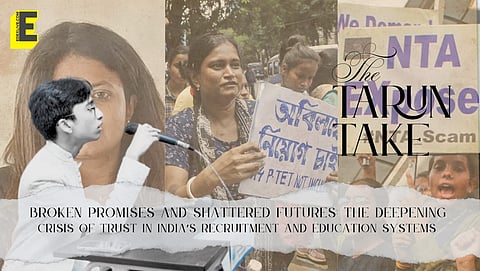

Over the last year, we’ve seen educational controversies galore.
Indian students and aspirants to public services have increasingly found themselves battling fierce competition, systemic failures, corruption, deception, and gaps in the selection processes.
With every scam and examination, the bond of trust and engagement between the Indian state and its youth grows weaker.
Three high-profile controversies — the NEET-PG row, the trending West Bengal SSC scam, and the delayed Pooja Khedkar UPSC controversy — have laid bare the extent to which India's education and recruitment systems are hemorrhaging credibility and creating implications for the country’s democratic and developmental aspirations.
NEET-PG 2024: A mockery of merit
Once hailed as a gateway to postgraduate medical education, in 2024, that gateway began to resemble a revolving door of chaos, with each turn eroding public faith.
A haphazard transition from a single-shift to a two-shift format was accompanied by a deeply flawed normalisation process, which shattered the dreams of thousands.
To make matters worse, the NBEMS offered no clear explanation, no public answer keys, and no accountability.
When petitions reached the Supreme Court, they weren’t cries of political vendetta — the resulting delay in counselling, the transition to the NExT exam, and alleged paper leaks only added fuel to the fire.
This wasn’t just an exam controversy. When an education system loses its moral compass, the brightest minds begin to question whether merit truly matters — and whether their country still values their toil.
Petitioners sought to cancel and re-conduct the NEET-PG 2024 counselling Round 3, citing scheduling issues that allegedly allowed some ineligible candidates to block seats. The Supreme Court dismissed this plea.
The court has questioned the changes in the exam pattern and normalisation process, but has not yet ordered any specific action. The Supreme Court will hear petitions seeking a CBI probe into alleged irregularities in the medical entrance exam, NEET, on July 8, but its effectiveness remains to be seen.
The NEET-UG, today, is a mandatory requirement for pursuing MBBS degrees from foreign medical institutions, ultimately limiting the aspirations of those who desperately wanted to escape the rat-race of competition in Indian engineering and medical sciences.
West Bengal SSC Scam: Fraud as a policy framework
If the NEET-PG issue was a bureaucratic mismanagement, the 2016 West Bengal SSC scam is a brazen blueprint of organised deception.
Over 25,752 illegal appointments, OMR sheet manipulations, and a chilling destruction of original exam records indicate not just mismanagement, but an attempt to loot an opportunity for the deserving and hand it over to the well-connected.
It’s not just the staggering numbers — 6,276 illegal appointees identified, rank manipulation, out-of-panel selections — but the sheer boldness of the cover-up.
A private firm, Nysa Communications, was hired through an inadequate tender process and allowed to destroy the very evidence needed to protect the sanctity of the exam. Even more appalling is the revelation that supernumerary posts were created post facto to whitewash the illegality.
What’s most disheartening, though, is the legal back-and-forth and the financial turmoil for the government and the aspirants.
After the Calcutta High Court cancelled all appointments, the Supreme Court stayed the verdict briefly, before eventually affirming the complete collapse of the process in 2025. One would think the system worked, but tell that to the thousands of deserving candidates who were turned away, their futures irreparably damaged.
The Leader of the Opposition, Lok Sabha, Rahul Gandhi even wrote to the President addressing it’s grievances, but with the ongoing evidence tampering by the State Government, sizable action seems like a judicial backlog of the next ten years.
III. The Pooja Khedkar Row: Privilege Masquerading as Disadvantage
What happened in the case of Pooja Khedkar, a 2023-batch IAS officer, reveals a different but equally corrosive trend.
While marginalised communities continue to struggle for fair representation, here was an individual from a family with declared assets over Rs 40 crore, allegedly misusing the OBC non-creamy layer reservation, skipping medical tests, and seeking unwarranted accommodations.
Even before assuming official duties, Khedkar demanded an official car, a VIP number plate, a chamber, and staff — all violations of protocol. When reprimanded, she retaliated by attempting to assert control over senior officers' spaces.
While her transfer to Washim district is presented as disciplinary action, it doesn’t erase the systemic failure that allowed her to pass through unchallenged.
The UPSC is not merely an exam; it is a symbol of the Republic's promise of equal opportunity. Khedkar’s case breaks that aspiration.
The Central Thesis: A crisis of faith
Each of these three cases — though distinct in actors and modalities, shares a common thread: The erosion of faith in the Indian education and recruitment ecosystem.
This is not an exaggeration — it’s a sentiment echoed in counselling centres, on social media, and in courtrooms. Every scam, every controversy, every botched exam widens the void of mistrust between the aspirant and the state.
The Way Forward: Restore, reform, rebuild
This crisis cannot be solved by cosmetic responses or political soundbites. It requires:
Every public examination must adopt real-time publication of answer keys, rank lists, and normalisation formulas. Agencies like the UPSC, NBE, and State Commissions must be made answerable to independent bodies, not just ministries.
Whistleblowers who dare to speak up must be shielded, not punished, and affirmative action is essential — but it must not be a tool of privilege disguised as oppression. The stakes are not merely individual careers or test scores. The stakes are the very idea of India as a land of opportunity and fairness.
It’s not just about the future of education. It’s about the future of trust.
(Tarun Tapan Bhuyan is a student studying in SAI International School. Views expressed are his own.)
